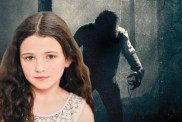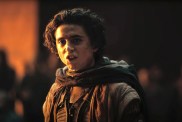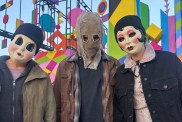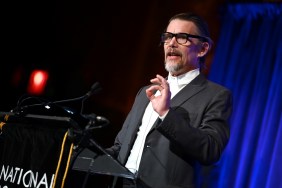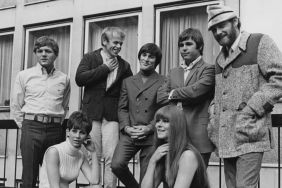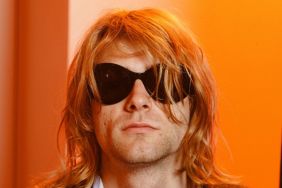“I would literally do anything for Richard Curtis.” It’s an odd admission for British actress Talulah Riley to make, and instantly prompts an impertinent question from one of the journalists at the roundtable interview. It also gives an indication as to the respect that Richard Curtis commands in his home country.
It’s not just Riley who was honored to be working with the director. Even Nick Frost, who plays Radio Rock’s DJ Dave, was grateful for a chance to be a part of Curtis’ cast. “I’ve grown up watching things by Richard Curtis, like ‘Blackadder,’ so for him to write a role specifically for me was great. I didn’t even realize he knew I was alive, let alone was a fan and would want me to be in one of his films. It’s flattering.”
The acclaimed director’s latest movie Pirate Radio is the sixties-set story of Radio Rock; a pirate radio station based on a boat floating in the international waters off the coast of Britain, as well as her misfit crew of DJs, producers and assorted oddballs, all told through the eyes of 18 year-old Carl (Tom Sturridge).
“It was just nice to be someone who is almost a voyeur on everybody else, especially as I knew that the people involved were going to be so exciting and interesting.” Sturridge says of his character, “I just sort of wanted to be a part of that group.” The description also seems a good fit for Sturridge himself. A relative newcomer to the world of acting, he claims to have fallen into the profession when asked to audition for a film made by a favorite director.
“I was very obsessed with film when I was younger. There was a director, Istvan Szabo, who made ‘Mephisto,’ which is like one of my favorite films… somebody who knew me, cast me in a film of his. She couldn’t find anyone who was a 17-year-old boy in the professional setting. Basically, she started getting her son’s friends because she couldn’t find anyone.
“That experience of working with him, I lived in Budapest for two months, I was 17, it was my first proper summer away from any world I knew, was a formative experience. Working with someone like that, you definitely come out of it with romantic illusions that filmmaking is an artistic process with people who want to do something beautiful, even if it doesn’t turn out like that.”
Still, despite his relative inexperience, Sturridge managed to hold his own amongst a cast of some of the most successful comedic actors working today. This was particularly impressive, given how remarkable the production process on the film was. While half the movie was shot in a studio, the other half was shot on a real boat.
“150 people get on a boat at six in the morning, as the sun rises, the boat goes out to sea as far as it can without being dangerous,” Sturridge explains, “and shoot for six weeks like that.” Even when they did make it into the studio it was no picnic for the cast, “The main aspect of the studio experience was that all the sets were on gimbals to replicate the boat, which was actually more sickening. Being on the boat was fine because it was enormous, but these gimbals had different settings for different weather levels. Literally, enormous sets would be moving like that and everybody wanted to throw up.”
Amongst all this, Sturridge and Riley also had to cope with their cast mates’ willingness to play fast and loose with the script. “Because they’re comedians they were improvising, which is something I would not dare to do.” Riley tells us, “I would not touch a Richard Curtis script and try to improve on it. But there was a lot of backwards and forwards. But that was all the boys’ stuff. I didn’t get to do a lot of that.”
To help his actors create their characters Curtis immersed them in the world of nineteen sixties pirate radio. To guarantee his cast were familiar with the music he issued them with iPods, choc-full of music from the era. As Riley boasts, “I don’t have to go and look for ’60s music ever again, I’ve got it year by year.” This was then complimented by Curtis constantly playing music to his cast and crew.
For most of the cast Curtis’ selection of songs served only as a reminder of familiar tunes. For Nick Frost, however, it prompted a confession: “In the first week of the film I said to Richard, ‘I need to talk to you.’ So he came over, and I said, ‘I’ve never listened to a Rolling Stones record.’ And he was like ‘Don’t tell anyone,’ and he immediately said ‘Bill!,’ and got Bill Nighy over, who’s a massive Stones nut, and the two of them told me off for five minutes.”
Perhaps inspired by his lack of musical knowledge, it was arranged for Nick to meet one of the real-life Pirate Radio DJs, Johnnie Walker, who had worked aboard Radio Caroline in the 1960s.
“They arranged for me to go on his show live, and hang out with him and see how he works. He was great. He invited me into the studio, and I thought, this is going to be great, and I was watching him for ten minutes and he said, ‘you know what, you’ve got to leave.’ I said, ‘oh, alright. Sure.’ I was meant to be on there for two hours, but I think he just wanted to play music and not have me looking over his shoulder.”
As well as meticulously preparing his cast, Curtis also paid close attention to the sets. Built at Shepperton Studios, these involved creating the interiors of the boat on massive gimbals, allowing them to move as if at sea. This caused the crew some problems, as Frost laments, “The only time I got seasick on the whole project was when we were in the studio.”
Despite his queasiness, Frost was genuinely impressed by it all. “I went through that set before we started shooting, and I was opening every drawer and cupboard, and every drawer and cupboard was full of period food and period cups. I thought, why? You’re never going to see in there. Then sure enough, when they set the rocker to seven, and everything’s coming out of the cupboard, you think, ‘oh, right. This is why they built it so precisely.'”
While intricate, the sets also replicated the cramped conditions onboard ship. During one scene this led to Frost and Sturridge getting very close, whilst very naked. Fortunately neither was too traumatized by the experience. “It was great to shoot those scenes. It’s not every day you get to do a job where you get to wander around naked and people don’t give a sh*t.” Frost explains, “If you had to show an alien race just how different the human form can be, I think Tom would be at one end and I’d be at the other.”
For Sturridge the experience was equally tolerable. “I think the thing I love most about acting is not giving a sh*t, and not being embarrassed about anything. On that level, it was about taking off my clothes and standing naked in front of human perfection.”
At around the same time in the film Frost is also in close confines with Riley. Despite achieving many a man’s dream, Frost was far more comfortable in the toilet with Sturridge than he was in bed with Riley, as the actress explains.
“It was his first bedroom scene and mine, not that we actually did much. As soon as we were semi-naked under the covers he was like ‘you know I’m engaged.’ And I was like, ‘great. That’s great.’ He was telling me about the flowers and the church and I was like ‘I’m not touching you.’ It was quite interesting, quite a turn of events. Maybe he’s a shy guy.”
Despite her brief moment in the sack with Frost, Riley’s real romantic interest in the movie is Sturridge. This led to her own moments of discomfort, as she confides, “The love scenes with Tom were awkward. He’s like my best friend. We’ve known each other forever and ever.” Riley continued, “Obviously we’d always avoided ever being – I’d never kissed him or anything like that, but it was always like in that ‘When Harry Met Sally’ way, there’s always been that, y’know. So when we had to hop into bed together it was awkward.”
The most uncomfortable moment for the pair came when they had to share an on-screen kiss. “The kiss was meant to be really scripted, because I was so freaked out about it that Emma, the script editor and Richard’s partner, had me in the other room saying ‘it’s going to be fine, it’s going to be fine.’ We’d literally worked out blow-by-blow the kiss we were going to do… Then we were stood there and Tom would come nowhere near me.”
In addition to the romantic elements in the film, there are a huge number of bizarre incidents, ranging from a wedding at sea to the return of a former DJ. According to Frost, this is because of the length of time the story covers. The original pirate radio ships broadcast from 1964, and were finally outlawed in 1967. The film itself covers a period of around two years. This forced Curtis to be creative with the movie’s structure, as Frost explains, “With a film where the story’s that long, it’s difficult to keep a narrative thread through the whole film. I think Richard shot it in a way where it’s essentially sketches put together with the ship being the strand through the whole thing.”
This also had implications for the characters. “We worked out that Dave had been on the ship for three and a half years,” Frost reveals, “You think, ‘That’s a long time to be on a ship.'”
Despite the extraordinary length of time in front of the camera, and the hardship of spending much of the production suffering from motion sickness, it was an experience the cast will never forget. “We were staying in Dorset and going out on the boat every day. It was lovely. It was like a holiday for me. I was like, down there, do a bit of work, relax.” Riley says, of her unique experience, “The best memories of the film were being on the boat itself. Not the kind of thing you get to usually do.” Sturridge is a little more succinct, but no less sincere, “It’s so disgusting to say, but making a Richard Curtis film is like being in a Richard Curtis film. It was a really good summer.”
Pirate Radio opens on Friday, November 13. Also check out our exclusive video interview with RIchard Curtis here.

